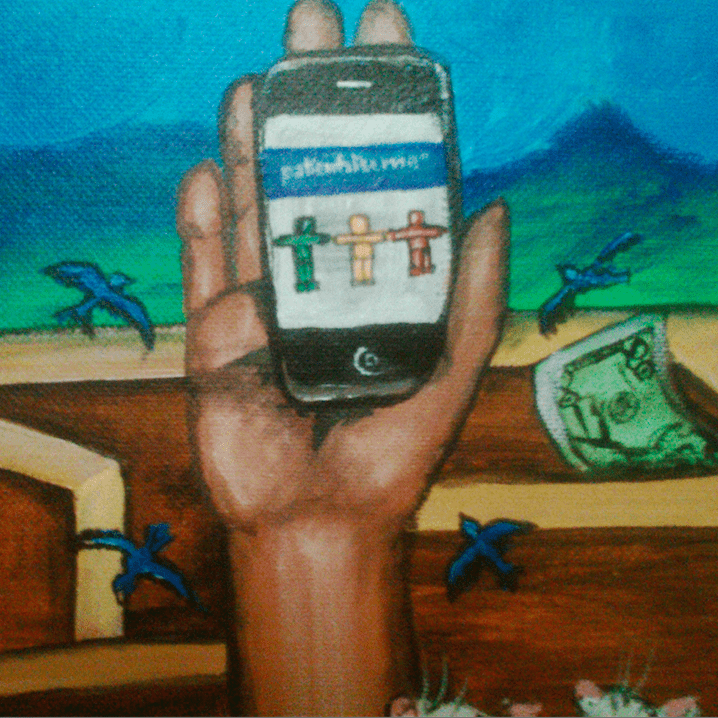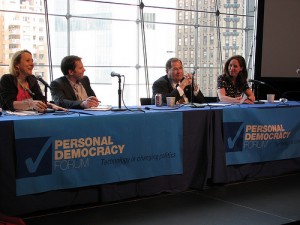
The poli-tech tribe gathered in New York last week for the Personal Democracy Forum and, as Craig Newmark put it, welcomed “our new nerd overlords.”
Esther Dyson, Jamie Heywood, Rep. Jerry Nadler (D-NY), and I were asked to take on a breakout panel entitled, “From Participatory Politics to Participatory Medicine: The Coming Revolution in Health Care.” Cool, right?

Via email, Esther suggested we skip the usual speeches and just tell the audience the questions we’d like to be asked and have a truly participatory session:
- Jamie was going to talk about PatientsLikeMe, HealthDataRights.org, and the power of patients to take control of their own data.
- Esther was going to ask how openness, transparency, measurement, and sharing of data affect health care.
- I was going to talk about which tech trends might forecast higher (or lower) levels of involvement by all Americans in both participatory medicine and participatory democracy.
Then Rep. Nadler arrived and said he’d been told that this was a panel about health care reform. Well, kind of. Not really. But we had to get started.
It didn’t go well.
Check the tweets:
@RadioBabe Interesting panelists, interesting ideas, but overall this health care panel at #pdf09 has been awkward and disappointing.
@lolamacc health care panel = very scattered discussion with little focus, too many issues, little really that was clearly conveyed
@mpesce Wasn’t this panel supposed to be about participatory medicine? I don’t see a whole lot of that going on here.
Ouch! Nobody was nauseated, right?
When I described the situation to Chris Schroeder, CEO of HealthCentral, he reassured me: “Your panel didn’t fail. It sounds like the audience got to see first-hand just how far technology remains removed from the heart of the health care policy debate in Washington.”
I’m even more comforted by the tao of Ted Eytan which teaches that “no communication is ever over” and “everything gets more accurate with more interaction.”
Judging from the majority of tweets, we did get quite a few points across, so let’s build on that:
Read more about Esther’s quantification of everything and the principles of HealthDataRights.org. Where do you come down?
Check out PatientsLikeMe. Jamie says people who use it will live longer; people who don’t won’t. What do you think?
Dr. Google is a pretty good diagnostician, most people say online health info is helpful not harmful, but access is unevenly distributed. What’s up with that?
Please leave a comment here, on Twitter, point me to another venue, or otherwise continue the conversation.
Susannah,
What a great demonstration of the value of Web2.0 in getting you the feedback about your work on the panel in near-real time, and allowing you to act on it. What would this have been like if traditional evaluation methods had been used?
This is a great model for health care itself, when health care teams might get this feedback, directly, in near real time, and be able to continue the conversation with their patients about how to improve their care for them, just like you did for your audience…
Susannah, loved your post. I had a similar twitter feedback experience at SXSW this year – helped us make course corrections as we spoke. Kind of daunting, though, to track audience comments while you moderate – sometimes I feel like an extra brain would be handy.
I have one quibble with your post. It doesn’t communicate why the panel didn’t work – at least, I didn’t completely get it. You tell us how it was set up and how it was received, but I would love to see a paragraph with your explicit thoughts about what went wrong.
It’s like I’m arriving at the end and hearing the grumbling, but not quite understanding what it’s about.
Ted, thanks so much – it was your spirit of optimism that inspired this post!
Jon, I am really impressed by the idea of tracking comments in real time and changing the course of a panel discussion. Someone tweeted that SXSW is years ahead of PdF in terms of tech innovation – more proof.
As for why the panel didn’t work? Maybe we got off on a wrong foot and never recovered (that’s what some audience members tweeted and I did feel that happening). Another reason is that it was an ambitious topic and maybe we should have done a bit more speechifying to lay the groundwork for discussion.
But I don’t want to dwell too much on the negative. I think we did reach some people and we did raise some good questions. I think we even provided a little theater (a self-identified doctor stormed out after an off-the-cuff comment by Jamie about docs’ false sense of power – she later found him in the hallway and shared some choice words).
From my own experience, I’d guess the breakdown was that the panelists never got together on the phone for 5 minutes to go over what the topic is. To me that’s always valuable. Having someone show up (Nadler in this case?) with a wrong idea of the subject is always a recipe for mischief.
But, Susannah, did I miss something? I don’t think you explicitly said what you mean by “it didn’t go well.” You cited other people’s tweets, but what did YOU think?
Did one person dominate the talk, or was it unguided and aimless, or what?
Oh, and what do you want for a do-over? Whatcha askin’ for?
I think we went off the rails when we took Rep. Nadler’s bait to focus on political & legislative possibilities. He kicked off his remarks with a 10-minute (and by the way, interesting) soliloquy on the prospects for health care reform. All of a sudden it seemed odd to jump back to participatory medicine, so we didn’t.
As for what I want? I want to hear from people who were there: What were your take-aways? What questions popped up for you that didn’t get answered?
For example, the magic of Twitter has already brought the following take-aways from Cristóbal Palmer (@coxn): “1. ppl are getting better info online than I realized, 2. don’t have good framework for the interdisciplinary healthcare convo”
I also want to hear from people who weren’t there but want to engage in the conversation about the issues we wanted to discuss: openness, transparency, health data rights, who’s not online/engaged, will mobile internet access make a difference?
More take-aways from Twitter:
@claudiawilliams I found it a bit discombobulated. I would have loved to have any of the three of you tell your own story completely. Funny, because I usually love a discussion format. It’s just that no story emerged. Not sure why that is.
@tummler10 Still processing. Chatted with Jaime H après. Felt that Nadler was an indicator of well meaning politico who wasn’t listening.
I felt that there was was no glue, no direction and that the lack of cohesion was made worse by a grandiose and majestic environment.
That room was the most amazing conference room I have ever seen .
The lack of cohesiveness was pretty apparent for someone who has heard the individuals on the panels at other events. Which raises a good question: what is the glue between the well known focus areas of Susannah Fox, Jamie Heywood and Esther Dyson?
If we can’t figure this one it is going to be difficult to make the case for Participatory Medicine in forums where we should expend our reach. Preaching to the quire is easy. Explaining to new audiences the universal reasons to promote Participatory Medicine may be more difficult than we imagined. Until we know to do this well, we may remain a side topic for specialists only. The lack of participation from the audience was telling.
In this sense the panel was a great success. I don’t believe we would have figured out this problem without going through this process.
Jerry Nadler, a real political veteran, just saw the opportunity to promote his brand. Nothing wrong with that. But he totally killed the opportunity to present, in a political forum, the social and political values associated with patient involvement. He basically confirmed my suspicion that in DC, healthcare reform is just about money. And because health care reform won’t include a move from paternalism to participation, I am afraid that we will end up sooner than later with a nasty case of Goodhart’s law. I say that with some despair because I really like Jerry Nadler. If one of the most liberal members of congress doesn’t get it, who will?
Thank you, Gilles! I am so glad you were there to witness this panel.
First, the room *was* breathtaking. Here is another photo: http://www.flickr.com/photos/hyperpeople/3672342077/ And check out the view behind me in this video: http://www.youtube.com/watch?v=ikpZE7aw4Tw How anyone was able to focus on us instead of the view is beyond me!
Esther, Jamie and I had dinner the night before, along with Tristan Harris of Apture. If only one of us had recorded that conversation since it was about 100x more interesting than what happened on the panel. I would say the glue was our common interest in data-driven, patient-driven innovation. I won’t try to capture it beyond that in this space – maybe later.
The most important point you make is the challenge of presenting participatory medicine to new audiences. It’s heartbreaking, frankly. I so wanted to hear what this audience thought about the issues we outlined in advance.
Hence, this post!
My take away from the conversation was this: information is currency and most patients want to be rich.
I think the difference of opinions and directions on the panel was a fair reflection of the layers to the health care debate. How can health records be more accessible? How can patients take control of their care and find information online? And during legislative sessions, how can government manage patient expectations and reform the system to focus on positive outcomes…not the amount of services patients receive?
Great comment, Erica, thanks so much (all: she produced the video I link to above).
When I tweeted the first part, I got this response:
@tummler10 W/ respect, I want to amend @EricaAmerica’s comment: most patients don’t know HOW to get rich.
So how can patients get information-rich?
When reporters ask me if I have advice for consumers I defer to the Medical Library Association’s guide: http://www.mlanet.org/resources/consumr_index.html
Some other resources recommended to me include:
Cancer: Pathfinders, developed by M.D. Anderson librarians (via @shamsha): http://www.mdanderson.org/patient-and-cancer-information/guide-to-md-anderson/places-to-visit/the-learning-center.html
National Institutes of Health (via @RoyWilkinson): http://health.nih.gov/
But I’d classify most of those sites as consumer-strength. Industrial-strength health info is more likely to be found in PubMed, patient communities – where else?
Esther Dyson published an essay in the Financial Times on Aug. 12 which sums up what we *meant* to talk about at PdF09:
“Indeed, healthcare is ripe for the kind of revolution we are having in politics, due both to a backlash against the dysfunctionality of the old system and to the power that the internet gives people to collect information and organise themselves.
The internet is changing people’s expectations of what they have a right to know and say: just as they expect to know more about their politicians, they expect to know more about their own health institutions – and to criticise them publicly. Websites let people rate their own doctors and hospitals, even as public pressure and occasionally public rules demand more and more transparency about performance and outcomes.
With these resources, people are taking a more active role in their own health. Instead of relying on the medical establishment, they are searching for information on the internet in order to do for themselves what institutions cannot or do not.
They are using online tools to generate and manage information about themselves. Health and healthcare are personal in a way that politics is not.”
Read the whole thing: http://bit.ly/EXyiM